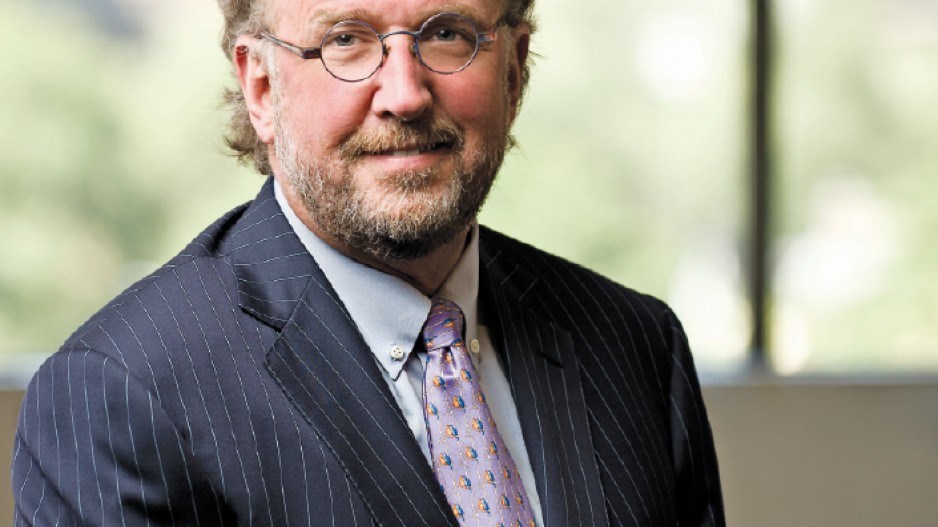In Canada we trust. Many others around the world share that trust. And that’s good for business in B.C., because trust, as measured globally each year by the Edelman Trust Barometer (ETB), is becoming increasingly rare and increasingly valuable.
Bearers of the ETB were in town February 26 to spread the word about this year’s prevailing barometric trust pressures as John Clinton, Edelman Canada CEO, and Ben Boyd, Edelman’s Corporate Practice Global chairman, presented some key Canadian ETB findings to the Vancouver Board of Trade (VBOT).
As is the case with most barometric readings, there was good news and bad news on the horizon.
Edelman, the world’s largest independent public relations firm, launched its ETB in 2001.
Richard Edelman, Edelman president and CEO, told Business in Vancouver in 2011 that the inspiration for the barometer came in the wake of the 1999 Battle of Seattle protest at the World Trade Organization ministerial conference.
“All the NGOs [non-governmental organizations] marching down the middle of main street in Seattle and trashing stores, and we couldn’t understand why NGOs, which had never been visible in the United States, were suddenly coming to prominence. So we decided to test NGO credibility against business, government and media.”
That testing has taken on some prominence of its own. The 14th annual ETB presented at the VBOT luncheon is based on an online survey of 33,000 respondents in 27 countries.
In an interview prior to the February 26 VBOT presentation, Clinton described the survey as “the single most important piece of IP [intellectual property] that we do, and I would say it’s the single most important piece of IP done in the communications industry.”
Regardless of whether you swallow that description whole, the ETB is a wide-ranging measurement of how a cross-section of what Edelman described as “opinion elites” and the ETB calls “informed publics” view truth, ethics and trust in high places.
That brings us back to those good-news-bad-news barometric readings.
Reasons to be cheerful for B.C. include the buoyancy of Canada’s brand elsewhere in the world.
As Boyd pointed out to the VBOT audience: Canada, along with Germany, Sweden and Switzerland, remains one of the world’s most trusted countries.
That gives multinational companies based in Canada significant leverage in the world market.
Not surprisingly, Canadians have more trust in companies that are based in Canada. But Clinton also pointed out that “in the U.S. they rank Canadian head-office companies higher than American companies.”
Canadian business virtues don’t count for much in the global marketplace, however, if a company’s potential customers don’t know it’s Canadian.
“[So] instead of hiding our Canadianism in other countries, we should be promoting it. … If you look at a company like HootSuite doing business all over the globe, being Canadian is a positive thing and something that makes them very exportable.”
The issues of Canadian timidity about selling the values of Canada abroad and the reluctance of Canadian companies to become major global players were raised last year by Joe Andrew, global chairman of Dentons, a top 10 multinational law firm.
In an interview from Montreal, where he was attending the Conférence de Montréal and chairing a plenary session on the new global economy, he told BIV that Canada’s CEOs are awakening to the realization that one of the biggest risks they now face is the risk of doing nothing in world markets.
Meanwhile, bad news from the barometer readings resides largely in corporate and government leadership ranks, where credibility is bottom-of-the-barrel stuff.
Trust in Canadian CEOs as credible information sources is limping along at 33% compared with 73% for an academic or expert.
“What’s really scary,” said Clinton, “are the numbers when you ask about CEOs or government officials telling the truth [7%].”
That confidence deficit, he said, translates to CEOs no longer having the benefit of the doubt in the court of public opinion.
While government, according to the barometer, is now the least trusted institution, trust in business has recovered from the dark days of the 2008 recession to the point that it is now trusted more than government for the first time since 2010.
Therein lies the opportunity for businesses to step up and lead, said Clinton, “provided they do so in an ethical way.”
He added that Canadians, who, according to the ETB, are far bigger fans of regulation than are Americans, want business to be more involved in the debate over regulation “so it comes out more balanced, and that’s where the big opportunity for business is.”
Edelman summed up the oft-combative business-government relationship best in 2011:
“People see [business and government] as marriage partners who may scream at each other but ultimately have to co-exist in the same bedroom; government’s best job is laying out the playing field and letting the business guys play on the field; [the public] doesn’t want business to be subsumed by government, but they want a referee.” •




